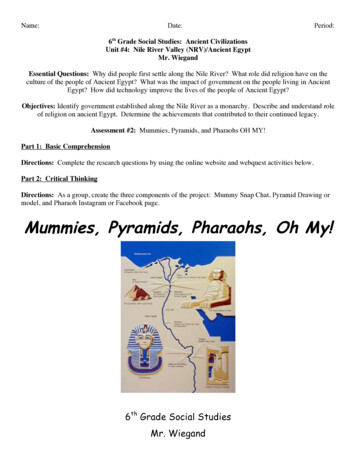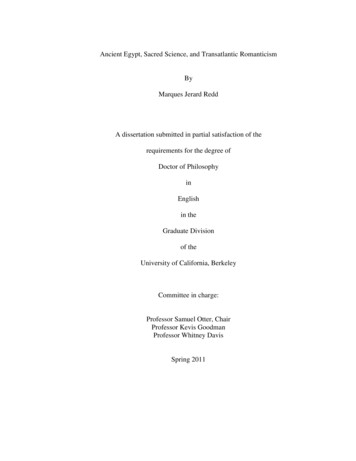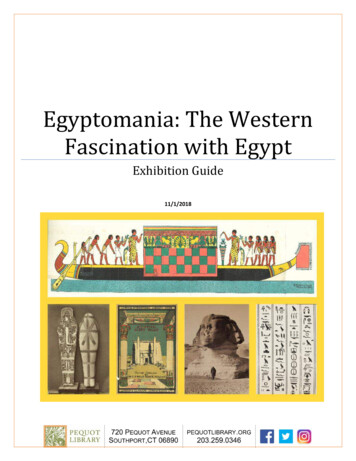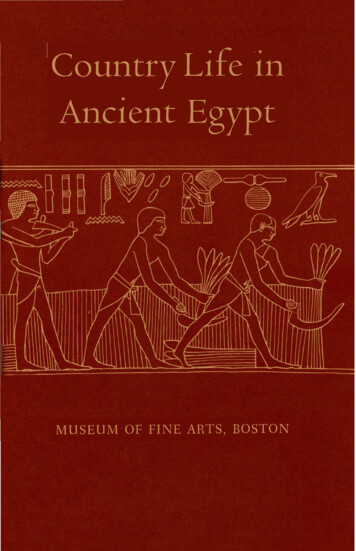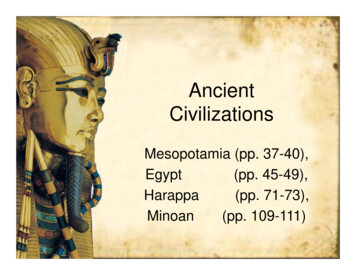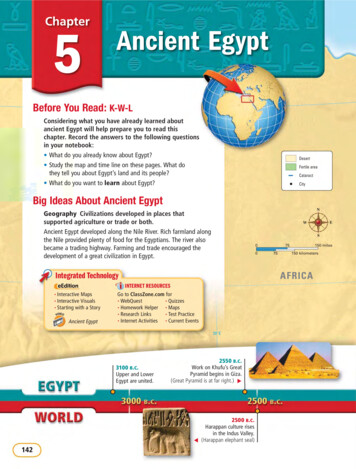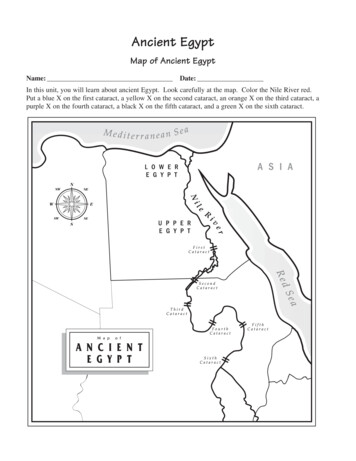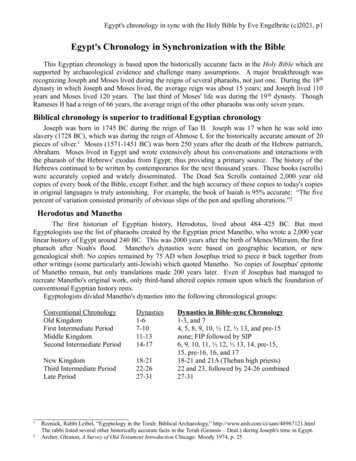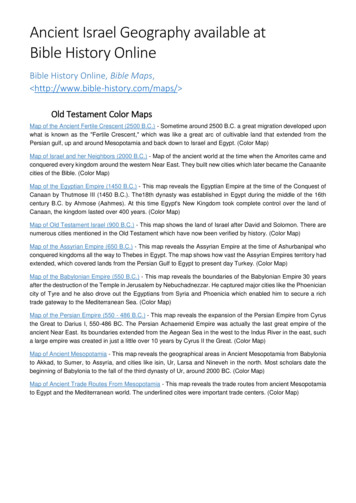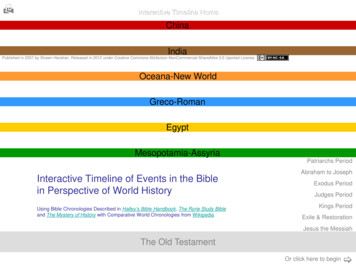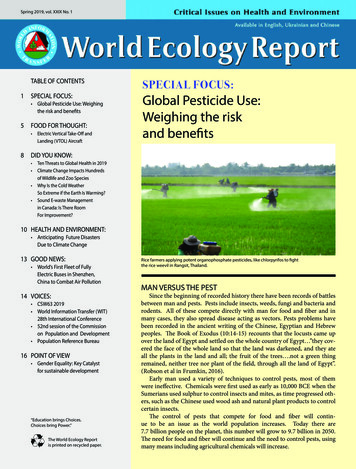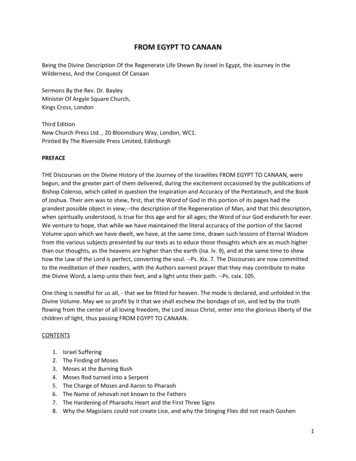
Transcription
FROM EGYPT TO CANAANBeing the Divine Description Of the Regenerate Life Shewn By Israel In Egypt, the Journey In theWilderness, And the Conquest Of CanaanSermons By the Rev. Dr. BayleyMinister Of Argyle Square Church,Kings Cross, LondonThird EditionNew Church Press Ltd. , 20 Bloomsbury Way, London, WC1.Printed By The Riverside Press Limited, EdinburghPREFACETHE Discourses on the Divine History of the Journey of the Israelites FROM EGYPT TO CANAAN, werebegun, and the greater part of them delivered, during the excitement occasioned by the publications ofBishop Colenso, which called in question the Inspiration and Accuracy of the Pentateuch, and the Bookof Joshua. Their aim was to shew, first, that the Word of God in this portion of its pages had thegrandest possible object in view;--the description of the Regeneration of Man, and that this description,when spiritually understood, is true for this age and for all ages; the Word of our God endureth for ever.We venture to hope, that while we have maintained the literal accuracy of the portion of the SacredVolume upon which we have dwelt, we have, at the same time, drawn such lessons of Eternal Wisdomfrom the various subjects presented by our texts as to educe those thoughts which are as much higherthan our thoughts, as the heavens are higher than the earth (Isa. lv. 9), and at the same time to shewhow the Law of the Lord is perfect, converting the soul. --Ps. Xix. 7. The Discourses are now committedto the meditation of their readers, with the Authors earnest prayer that they may contribute to makethe Divine Word, a lamp unto their feet, and a light unto their path. --Ps. cxix. 105.One thing is needful for us all, - that we be fitted for heaven. The mode is declared, and unfolded in theDivine Volume. May we so profit by it that we shall eschew the bondage of sin, and led by the truthflowing from the center of all loving freedom, the Lord Jesus Christ, enter into the glorious liberty of thechildren of light, thus passing FROM EGYPT TO CANAAN.CONTENTS1.2.3.4.5.6.7.8.Israel SufferingThe Finding of MosesMoses at the Burning BushMoses Rod turned into a SerpentThe Charge of Moses and Aaron to PharaohThe Name of Jehovah not known to the FathersThe Hardening of Pharaohs Heart and the First Three SignsWhy the Magicians could not create Lice, and why the Stinging Flies did not reach Goshen1
.43.44.45.46.47.48.49.50.51.52.The Plagues of Murrain, of Boils, and of HailThe Plagues of Locusts, of Darkness, and the Destruction of the First-BornThe PassoverThe Land flowing with Milk and HoneyThe Passage of the Red SeaThe Song of Moses, and the Bitter waters of MarahThe Quails and the DewThe MannaThe Battle with AmalekJethros Advice to Moses to choose RulersObedience, our Duty and our WisdomThe Ten CommandmentsSlavery amongst the IsraelitesThe Ox that gores a ManA Man smiting his Servant that he DieSeething the Kid in the Mothers MilkDriving out our Enemies little by littleThe Tabernacle for the SanctuaryThe Ark of the CovenantThe Mercy SeatThe Table of ShewbreadThe Sacred CandlestickThe Altar of IncenseThe Oil for the LampsThe VeilThe Hanging for the Door of the TentThe Laver for WashingThe Biter of Burnt-offeringThe Curtains of the TabernacleThe Court of the TabernacleThe Holy OintmentThe Holy IncenseThe Garments of AaronThe Breastplate of Precious StonesThe Atonement Money--the Ransom for SinThe Worship of the Golden CalfThe Two first Tables of Commandments broken and replacedThe Lord seen from the Cleft of a RockThe Lords Name declaredThe Face of Moses shining and veiledThe Spies and their Report of the Promised LandThe People bitten by Fiery Serpents, and healed by the Brazen SerpentBalaam and his AssMoses appointing Joshua his Successor2
53.54.55.56.57.58.59.60.The Death and Burial of MosesRahab and the SpiesThe Fall of JerichoAchans Sin and Israel's DefeatAi takenThe Covenant with the GibeonitesThe Battle with the Five Rings, and the Sun and Moon standing stillThe Death of JoshuaFROM EGYPT TO CANAANISRAEL SUFFERINGNow there arose up a new king over Egypt, which knew not Joseph. --Exodus 1. 8.THE divine history of Israel's freedom from Egyptian oppression, of their journeyings through thewilderness for forty years, and their settlement in Canaan, is the inspired record of regeneration. Hence,the pages of the Word of God have an interest far above that of any human composition. They form theBook of books. In their delineations, every soul may see its state pictured, its struggles described. Theirspirit speaks not of earthly interests, of temporal defeat or triumph, of the rise and decay of nations; butof the soul and its eternal concerns, of the movements of our own spiritual life, of those changes ofstate within, whose issues are to the good, unending peace; and to the evil, the wreck of every Godgiven faculty, perpetual blindness to truth, perpetual hatred to good, perpetual wrong, and therefore,perpetual misery. Ye must be born again is the grand lesson of the Divine Volume. The law of the Lord isperfect, converting the soul. Ps. xix. 7. I will open my mouth in a PARABLE, I will utter dark sayings ofold,--Ps. lxxviii. 2, said the Psalmist, when he was inspired to declare the wonders of the God of heavenshewn to the fathers of Israel at the Nile and in the desert; and to say, Marvelous things did He in thesight of their fathers in the land of Egypt, in the field of Zoan. He divided the sea, and caused them topass through, and He made the waters to stand as a heap. In the day-time also He led them with a cloud,and all the night with a light of fire. He clave the rocks in the wilderness, and gave them drink as out ofthe great depths. He brought streams also out of the rock, and caused waters to run down like rivers.12-16. Viewed thus, as bearing in its bosom spiritual, universal and eternal lessons, the wondrous Bookof God unfolds the evidences of its own divinity, of its inspiration from wisdom more than human. Whobut God could reveal the souls inner workings to itself, its sufferings in the bondage of sin, and itsyearnings for freedom; could describe step by step the obstacles, the temptations, the trials, thetriumphs, through which it attains inner freedom and blessedness, confirmed by an experience whichhas been found true to the consciousness of the pilgrims for heaven in every age? Never book spake likethis Book. The grass withereth, the flower fadeth, but the word of our God shall stand for ever. --Isa. xl.8.We must not be understood to mean that the Israelitish history is only spiritual or allegorical: its letter isdivinely true as a basis for its spirit, and in this respect it is most interesting and most wonderful. There3
are portions of the Bible,--the first eleven chapters of Genesis--which are wholly and only allegorical,because they relate to ages far before the time of earthly history, when spiritual things were all in allwith men; and it would be as little wise, to regard the tree of life, and the fountain of Paradise going outinto four rivers, the talking serpent, and the flood, of the beginning of the Divine Volume, as earthlyobjects, as it would be to so interpret the tree of life (Rev. xxii. 2), and the river of the water of life (ver.1), the serpent (Rev. xii. 3), and the flood (Rev. xii), of the last book of the Bible,--the Apocalypse,--andregard them as earthly objects. But after the decline of the early spiritual-minded ages it is otherwise.The histories are naturally true, but are so arranged by infinite wisdom, as to be the exact counterpartsof spiritual and eternal truths, which are realized in the Lords Church and in the soul of man. Like the veilon the face of Moses, they are real but translucent. The literal histories are clouds, but to the openedeyes of the thoughtful, bright clouds through which beams the perpetual glory of heaven.The events we are now considering are eminently interesting in their outward aspect. We have the mostremarkable of ancient nations in its proudest state; and Israel, soon to issue upon their wondrous careerof keepers of the oracles of God. We have Egypt, whose cultivation was complete and hoary with age,even at the time of the Exodus, nearly fifteen centuries before the coming of our Lord, and whichcontains massive monuments, probably of two thousand years before that period: Egypt, whose peoplewere declared by Herodotus to be the most learned of mankind, and whose priests read to him their listof three hundred and fifty kings, embraced in thirty dynasties. Egypt, that land of the mighty pyramids,the largest being the oldest, and compared with which, all modern buildings are but modest indimension.The land of immense temples, which are even yet unapproached in size; for St Peters, great as it is,cannot vie with the marvelous temple of Karnac, with its hall of more than a hundred gigantic columns.The land of great obelisks, statues, and sphinxes. The land of Thebes with its hundred gates; of Luxor, ofMemphis, of Meroe, of Philae, and of other wondrous sites. The land of the tombs, where life has soastonishingly been depicted and preserved in death.As might be expected, there are numerous illustrations and confirmations of the Sacred History, in therecords of Egyptian life of the period of the Exodus. These confirmations are summed up by eminentmen thus. The conquest of the shepherd kings by Pharaoh Amosis, the head of the eighteenth dynasty,synchronizes perfectly according to Egyptian chronology, with the rise of that king who knew notJoseph. As this Pharaoh had a son named Rameses, it is more than probable that one of the treasurecities, which he compelled the Israelites to build (Exodus i. 11), was called after his sons name. A tombof this time, at Thebes, has a pictorial representation of the Jews engaged in making bricks, withEgyptian taskmasters standing over them. No tomb has been discovered of Pharaoh fff1 Thothmes IV. ,whose reign was certainly a brief one, and who, it has been supposed, was the Pharaoh drowned in theRed Sea. This sovereign was not succeeded by his eldest son, which agrees with the Scripture narrativerespecting the destruction of the first-born in the land of Egypt. nnn1. Pharaoh was not a proper individual name, but a title of dignity, like Czar, Emperor or Sultan. Itsmeaning is son of the sun.4
We have brought Egypt thus vividly before us, that we may see clearly the reason for its spiritualsignification. Itself the land of science and of symbol, it became a grand symbol for all time. It was thecollection in ancient days of all that was great in worldly science, worldly grandeur, worldly learning,worldly fashion, and worldly religion. It was THE WORLD of those times, as contradistinguished frominner spiritual thoughts and feelings, and it became for ever the symbol in the Word of God, of theworld,--the outer region of mind with its intellectual attainments and sensuous life. The very positionand circumstances of the country strikingly exemplify its spiritual use. The land was formed from theNile, and by the Nile its wealth and fertility are constantly sustained. It is covered with vegetableabundance, but chiefly of grain. Few of the nobler trees are there, but lower products in plenty. It is notwatered by rain direct from heaven; its supply is indirect, gathered from lakes which lie far away insunny lands beneath the equator, and from mountains which lift their heads high up to catch the dewsand vapors of the upper sky. So is it with the worldly man; all his gifts, his science, his learning, hiswealth, his talents, his graces, his power and magnificence, come down to him from heaven, but notdirectly. They come it may be from remote ages, and through wiser and better men, but every giftcomes down from the Father of Lights. The worldling, like the Egyptian, enjoys his Nile, and does notperceive its source.Egypt is presented to us in Scripture in three aspects. First, as rendering friendly service to Abraham, toIsaac, and to Jacob, and especially as being saved and ruled over by Joseph. Secondly, as opposed toIsrael and unfriendly; and our text and the whole history of the Exodus exhibits this second and grievousmanifestation. And thirdly, as restored and in perfect harmony with Israel. This latter condition isdescribed by the prophet Isaiah, In that day there shall be an altar to the Lord in the midst of the land ofEgypt, and a pillar at the border thereof to the Lord. --xix. 19. Out text alludes to the two formerconditions. Now there arose up a new king over Egypt who knew not Joseph.Egypt, in friendship with the patriarchs and ruled over by Joseph, is the beautiful representation of theworld as it is in religious childhood and youth. The world is beautiful to a child, all things smile upon it. Itrejoices with an innocent joy, in the sunshine, the glory, and the loveliness of earth. Its new young spirithails each fresh acquirement, and with a bee-like industry strives to gather honey from every mentalpower.The world is all fresh to the child, and it walks almost unharmed, unthinking of danger. Principles ofreligion from the Lord visit the young soul and wondrous things are done within, unknown to the worldaround, but fortifying the youthful mind, and preparing it for the regeneration of after days. Egypt,under Joseph, represents the soul of the young disciple under the holy principle of piety. When religionin early life has had its trials, and been faithful and pure, divine wisdom is revealed to it as it was toJoseph, and the soul is forewarned and forearmed against coming times of temptation in daily life, andits wants in spiritual famine are all supplied. All the chief virtues of religion, like the twelve sons of Jacobdescend into the region of his daily thought, sentiments, and works, and are there sustained. Such ayoung soul is in the world but not of the world. Every earthly purpose is subservient to the spirit ofreligion, as Egypt was to Joseph, and all goes well.5
The ruling aim of the soul, be it the desire for learning, for fame, or for wealth, is regarded as theservant of a higher aim, love to the Lord and His kingdom. This king knows Joseph, and gives him fullpower to rule in the land.The young soul, then, is like Egypt under this goodly rule. Pharaoh says unto Joseph, Forasmuch as Godhath shewed thee all this, there is none so discreet and wise as thou art: then shalt be over my house,and according unto thy word shall all my people be ruled. --Gen. xli. 39, 40.O seek the Lord betimes, and choose,The path of heavenly truth;The earth affords no lovelier sight,Than piety in youth.This lovely sight continues sometimes longer and sometimes shorter; but sooner or later, and more orless, probably with all persons, the latent evils of our fallen nature shew themselves, and a king rises upthat knows not Joseph, or in other words, a principle of evil unfolds itself in the soul, that is rebelliousagainst God, and has no regard for piety or religion. A lawless spirit reigns, self-will takes the place ofgentleness and obedience; the holy sentiments of childhood and youth are uncultivated, uncared for,and forgotten. The soul, then, is like Egypt under a wicked king. The condition of things is thatgraphically described in the chapter before us. There are the lawless Egyptians and their ruthless king:there are also the Israelites, downtrodden and suffering.The soul is more highly organized than the body. It is a world in miniature, a little universe. Innumerableideas, sentiments, thoughts, and feelings appear and disappear with the constantly moving activities ofthe mind. There are mental kingdoms, provinces, departments; in fact, all things in heaven and earth areused in the Divine Word to depict the principles and states of the soul. Instead of having no form, itcomprehends all forms, and in its entirety is human--it is a spiritual body. And all this is felt to be true toour perceptions. Hence, in our ordinary speech, all things in nature are employed to describe changes ofstate in the soul.The two kingdoms, heaven and hell, are both present in the heart and mind. There is some leading evil,like a horrid despot, reigning in the lower degree of the soul--the natural man, with subservientpassions, principles, sentiments and ideas. Self, in one form or another, is the central object in the heartthat is deceitful above all things (Jer. xvii. 9).Below, are pride, self-conceit, vanity, ostentation, with a variety of evil counselors perverting theimagination to think that wrong is right, that good is evil, and truth is false. Below these, are the lustswhich pander to the peculiar outward sins to which the soul is prone, whether the lusts of the flesh, thelusts of the eyes, or the pride of life (1 John, ii. 15). Besides these, there are the acquisitive powers ofthe soul, employed to provide the means for carrying out its projects of indulgence or aggrandizement,there are also the principles which cover all over with fair seemings of decency, modesty, and order,except in cases of degradation so deep as to be reckless of all good report, and lost to all appearance ofvirtue. Usually there is a decorous outside, a form of reason and religion, an appearance of morality,which makes a certain air of beauty around, though within there are dead mens bones and all6
uncleanness (Matt. xxiii. 27). Often indeed! with this prevalence of sin and selfishness within, there ismuch talk of devotedness to eternal things, and of reverence for the Scriptures, and for God; the form ofpiety, and the doctrines of faith are loudly maintained, but form alone, and faith alone. Every portion ofScripture which can be made to mean that we are sure of salvation, is diligently pressed into the serviceof inward sin, and the evil soul will believe anything, however crude, contradictory, or absurd: willbelieve that it was chosen from eternity out of thousands of others, equally deserving or undeserving,by the God of infinite love, to be saved whether it would or not: that its sins were taken away on ourLords cross nearly two thousand years before it was born, and had any sin: it will believe its sins areforgiven because a man says they are forgiven, though it feels their desires and delights as strong asever; in short, it will believe anything, only let it be spared from slaying self within and its darlingpropensities, or from yielding more obedience to the commandments of the God of love than such asthe world demands.This is the condition of the soul which Pharaoh and his kingdom represent in the first chapter of Exodus.A king has arisen who knows not Joseph. Piety in youth has given way to selfishness, pretense, and sin.Our Lord describes this state in that remarkable passage in the Gospel, When a strong man armedkeepeth his palace, his goods are in peace; but when a stronger than he shall come upon him andovercome him, he taketh from him all his armor wherein he trusted. --Luke xi. 21, 22.We have described the evil condition of the soul, but there is the other side. Divine mercy provides anIsrael in Egypt. There is the groundwork of good implanted by the Lord in the very embryo of our being,and which enabled Him to say of children, Of such is the kingdom of God.The hour is approaching when the trumpet of deliverance shall sound and this slavery shall end; but, inthe meantime, the principles and powers of good are made to serve. They build treasure cities forPharaoh, Pithom and Raamses, the latter city being called, there is reason to believe, after the kingseldest son, which the name suggests, fff1 and the former, Pithom, signifying an abundance for themouth; both being expressive of those gatherings of divine knowledge which are common with the evil,when they fear, and doubt, and dread, yet will not alter. They gather spiritual knowledge, to supporttheir eldest son, the conceit of a worthless faith: they gather abundance for profession, the mouth isfully supplied: but for self-sacrifices, for real love to God and their neighbor, they are miserable, andpoor, and blind, and naked. nnn1. Raamses, or Rameses, in Egyptian, means the offspring of the sun.The labor which they compel the Israelites to perform in clay (called wrongly, mortarin the text) andbrick, represents the bending and prostitution of things good and true in the soul, to be subservient towhat is evil and false. The filthiness of evil is expressed by clay, when used in reference to the wicked,and the artificial character of falsehood is expressed by brick as contrasted with stone. Of the Babelbuilders it is written, brick had they for stone, and slime had they for mortar. --Gen. xi. 3. In the Psalms,a foul and filthy state of the heart is signified by clay. I waited patiently for the Lord, and he inclinedunto me and heard my cry. He brought me up also out of a horrible pit, out of the miry clay, and set myfeet upon a rock, and established my goings. --Ps. xl. 1, 2. Save me, O God, for the waters are come inunto my soul. I sink in deep mire, where there is no standing. --Ps. lxix. 1, 2.7
Rocks, from their solid nature, and their use for foundations, and for walls, are the symbols offoundation-truths; hence, the Lord is called the rock of Israel, and the Head-Stone of the corner. Brickstherefore, as artificial substitutes for rock and stone, represent the substitutes for truths, which arefallacies.The scene of the Israelites laboring in the field with clay and brick strikingly symbolizes the condition ofthe soul, while knowing and yearning for what is good, being compelled to submit to what is evil andmake excuses for it. The mind in such cases feels itself defiled, loathes its occupation, but is compelledto slave on, and to find bad arguments which in its heart of hearts it condemns and abhors.Pharaoh becomes more and more alarmed, and more and more cruel and desperate. Hence, at last thedecree, that the midwives should destroy the male children.In spiritual things, the union of love and faith in the inmost soul is likened to a marriage, and theaffections and thoughts thence born in the mind to daughters and sons. The affections for truth aredaughters; hence, the muses with the ancients are represented as nine maidens, and in the Scriptureswe read of the daughter of Sion, the daughter of Jerusalem, the kings daughter, all glorious within; butthe more sturdy sons represent thoughts of truth, firm and strong.The gentle affections can be made subservient to evil states they can make sin graceful and lend itsupport. Indeed the strength and life of every evil system in the world arise chiefly from the hoodwinkedgood people who are associated with it. Pharaoh is quite content with them, Let the daughters live, hesays. They recommend a system which is fraught with evil and a curse to the world, they prop it up, theycontinue it, they make it respectable. But the sons of Israel, the true thoughts which spring up in themind are more penetrating and discriminating, they try evil systems and condemn them. Hence, evildreads the sons, and commands that they should be destroyed. It has been ever so, the thinkers terrifythe despots. The kings effort to destroy the male children by means of the midwives is an instructiverepresentation of an important fact. All true natural science is a midwife to spiritual realities, itillustrates them, confirms them, ushers them as it were into the world. It is friendly to spiritual truth, itpoints through nature up to natures God. All truth is in harmony, and each part conspires to strengthenthe other. Yet sin always wishes to set science against religion, the midwife to kill the child. But if themidwife be true, she ever fears God and preserves the child. God confirms the midwives, and makesthem houses.When astronomy was new, It was supposed by the opposers of divine things, to serve their purposes;and so with geology. But now, both are seen to point to eternal love, millions of ages past, storing theappliances of metals, minerals, soils, gases, in all their multiform and wondrous varieties while the innerand higher sense of Scripture unfolds to us truths of regeneration, which more than keep the childrenalive. So the midwives ever reply, the Hebrew women are lively, the children are born and live. And theywill live. The Lord Jesus by His law will break the bondage of Pharaoh. Heavens freedom must be given.THE FINDING OF MOSES8
And the daughter of Pharaoh came down to wash herself at the river: and her maidens walked along bythe rivers side; and when she saw the ark among the flags, she sent her maid to fetch it. And when shehad opened it, she saw the child, and, behold, the babe wept. And she had compassion on him, and said,This is one of the Hebrews children. Exodus ii. 5, 6.IT is an adage trite and true, that great events arise from little causes. No doubt, there is another side tothis truth. There must be causes adequate to produce all effects. And behind and underneath causesapparently weak and small, there must be immense powers, when the causes increase and becomemighty, and change the face of the world; yet how simple and powerless they seem at first. How forciblyis this truth illustrated by the circumstance presented in our text. Here was a little child born of despisedparents, hidden for safety in a frail chest of bulrushes, crudely preserved from the water and theobservation of the dangerous crocodile, feeble as feebleness itself, to all appearance; yet that child wasto be the deliverer of his people, the legislator of his nation, and not of that nation only, but through theDivine Word, of which he and his nation were the receivers and depositories, of the ever-increasingChristian nations, and for all time. Even in heaven they sing the song of Moses and of the Lamb.How clearly and how wonderfully does this teach us not to despise the day of small things, not toimagine that the race is ever to the strong, but to rest in perfect faith on the truth, that the Most Highruleth in the kingdom of men, and giveth it to whomsoever He will. If any one had been asked at thetime of the event recorded in our text, which will be the most influential in the world, the proud andpowerful Pharaoh who ruled the worlds mightiest and most ancient throne, or, that weak and weepingbabe, especially if the courtiers had thus been questioned, there would have been no doubt the kingwould have had every suffrage, but it was not so; the name of the once proud despot is scarcely known,while the name and influence of that infant will never die,God hath chosen the foolish things of the world to confound the wise, and base things of the world, andthings which are despised, and things which are not, to bring to nought things that are, that no fleshshould glory in his presence. --1 Cor. i. 27-29.The greatest of all examples of this kind, is that of the Lord himself: lonely, forsaken of every disciple,left to die upon the cross. He was rejected, despised, crucified. Against Him were his own nation, hisown kindred. Against Him were the Jewish dignitaries, entrenched in their rank and influence bycenturies of usage and prejudice, behind them the Roman Power, the greatest the world had everknown. There were Church and State in both these powers, rooted, ramified, triumphant. To allappearance, the dying Savior would have no influence in forming the new age, like that which these oldand powerful organizations would exert. But how different is the event. Embodied and entrenchederror, though surrounded by the respectability of antiquity, rank, fashion, prejudice, magnificence, andpower, has nevertheless faded, crumbled, and gone; while TRUTH, small, weak, rejected, trampledupon, supposed to be extinguished, nevertheless rose again, and with healing in its wings, spread itsholy splendors ever wider, ever grander, and will spread them until they embosom the whole earth. Themoral of all this is, let us be ever on the side of truth, however feeble or few they may be who hold itnow. The day is sure to come when the truth despised to-clay, will be welcomed by millions. Fear not,little flock; for it is your Fathers good pleasure to give you the kingdom.9
Permit me now to direct your attention to the spiritual lesson enclosed in the divine narrative before us.It is the birth of the law in the soul; that inner sense of right which becomes law to the conscience. Thename Moses signifies DRAWN OUT, and in giving it, Pharaohs daughter said, Because I drew him out ofthe water. --Ex. ii. 10. The spiritual Moses now, is the law of the divine commandments, its seen in theiressence and explained by the Lord. Thou shalt love the Lord thy God with all thy heart, and with all thysoul, and with all thy mind. This is the first and great commandment. And the second is like unto it. Thoushalt love thy neighbor as thyself. On these two commandments hang all the law and the prophets. -Matt. xxii. 40.The narratives, the histories, the prophecies, and psalms of the Divine Word seem to treat of animmense number of subjects, besides the two spoken of by the Lord, yet when their aim, their purposeis drawn out, the inculcation of love to God and love to man is really in them all.This essential law, then, is Moses. He is said to be born from a man of the house of Levi, and a daughterof Levi (ver. 1); because the conjunction of goodness and truth in the soul is likened in the Weld to amarriage, and is a spiritual marriage. When faith in the intellect is joined to affection in the heart, and isno longer faith alone, then holy feelings and thoughts are bent in the mental household within, and theprime birth of all, is this conscientious sense of divine right, this reverence for the divine will. Moses,stands throughout the Sacred Volume for the Law, sometimes in a wider, sometimes in a narrowersense.They have Moses and the prophets, said our Lord, let them hear them. Luke xvi. 29.And, begin
THE Discourses on the Divine History of the Journey of the Israelites FROM EGYPT TO CANAAN, were begun, and the greater part of them delivered, during the excitement occasioned by the publications of Bishop Colenso, which called in question the Inspiration and Accuracy of
